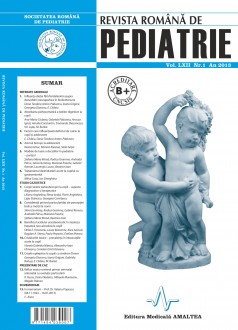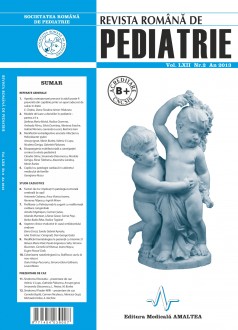SELECT ISSUE

Indexed

| |

|
|
|
| |
|
|
|

|
|
|
|
|
|
|
HIGHLIGHTS
National Awards “Science and Research”
NEW! RJP has announced the annually National Award for "Science and Research" for the best scientific articles published throughout the year in the official journal.
Read the Recommendations for the Conduct, Reporting, Editing, and Publication of Scholarly work in Medical Journals.
The published medical research literature is a global public good. Medical journal editors have a social responsibility to promote global health by publishing, whenever possible, research that furthers health worldwide.
Considerations on the particularities of the ilness and death perception for rroma people
Silvia Dumitraş, Rodica Gramma, Gabriel Roman, Andrada Pârvu, Mariana Enache, Stefana Maria Moisa and Beatrice Ioan
ABSTRACT
Through time, the rromas succeeded in maintaining a set of cultural and spiritual characteristics that helped them keep their ethnic identity and their social cohesion. They maintained the Romani language, their social structures, customary, magical-ritualistic and religious complexes, non-verbal types of language, traditional clothing and nomadic style of life. Objective. Identifying the perception of disease and death in the rroma traditional communities. Material and method. The qualitative research was conducted in rroma communities form Cluj and Iaşi counties. The investigative tool was the individual phenomenological interview. 23 interviews were conducted in Iasi and 25 in Cluj County, with chronic rroma patients and caregivers. A phenomenological analysis was used to point out the major topics resulting from the transcription. Results. Disease is interpreted mystically, as a punishment from God or as a curse. There is the belief that all life’s events are predetermined and inevitable. The disease is often associated with shame, being a representation of the spiritual and moral impurity. The rromas know or they have an intuition regarding the real risk factors for their illnesses. Conclusions. In the studied rroma communities, death and disease are taboo topics. Most rromas define health as the absence of the disease, while the disease is a debilitating phenomenon in direct link with death. The diagnostic is reduced to putting a label on the patient’s symptoms. As long as there are no symptoms, the disease does not exist and so the rromas do not respect the recommendations the physician made.
Key words: ethnic identity, rrom, disease, death

